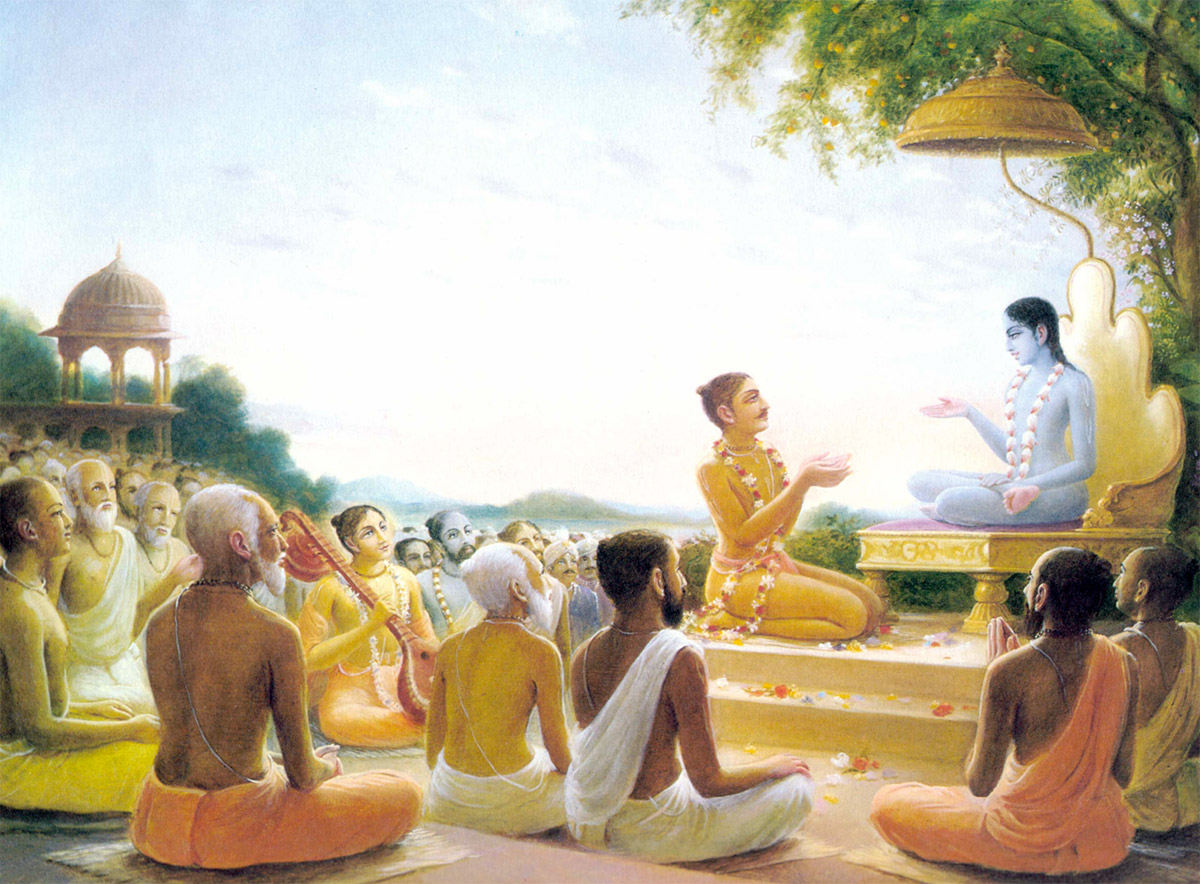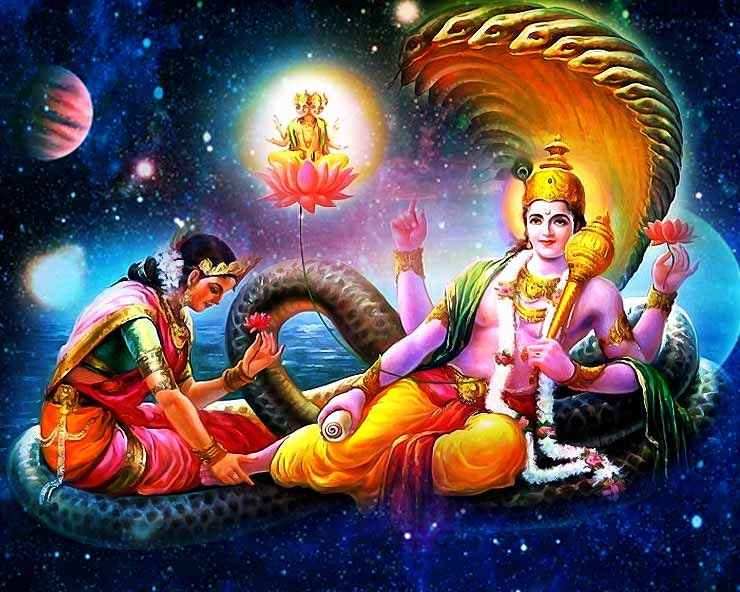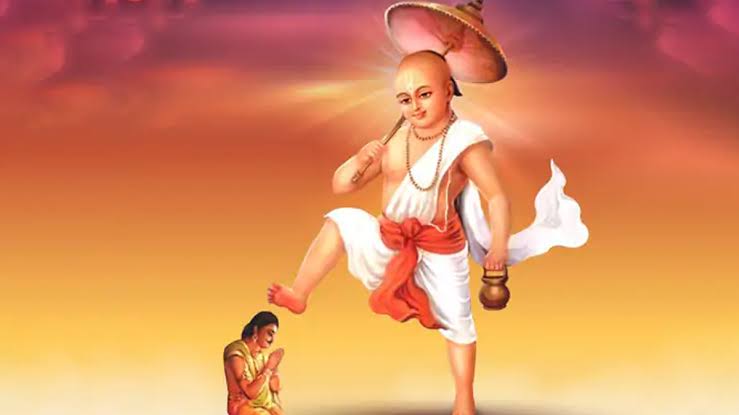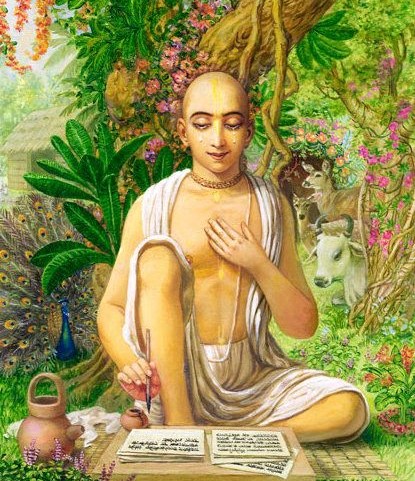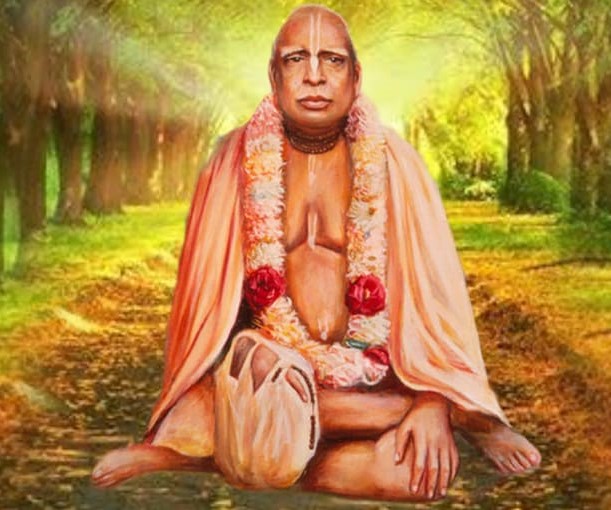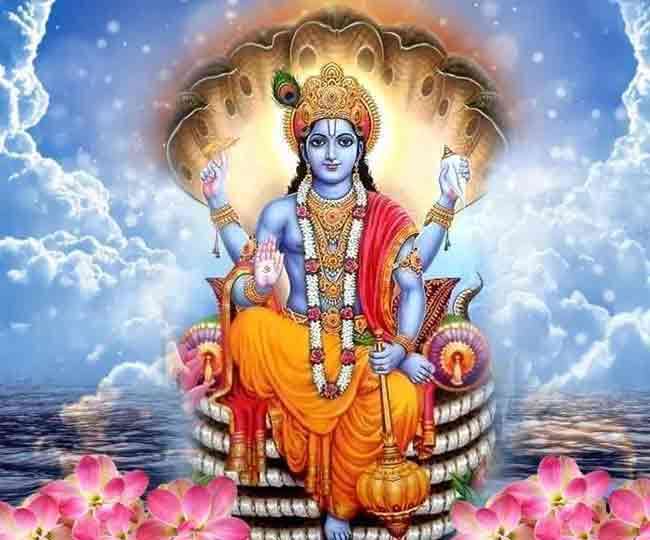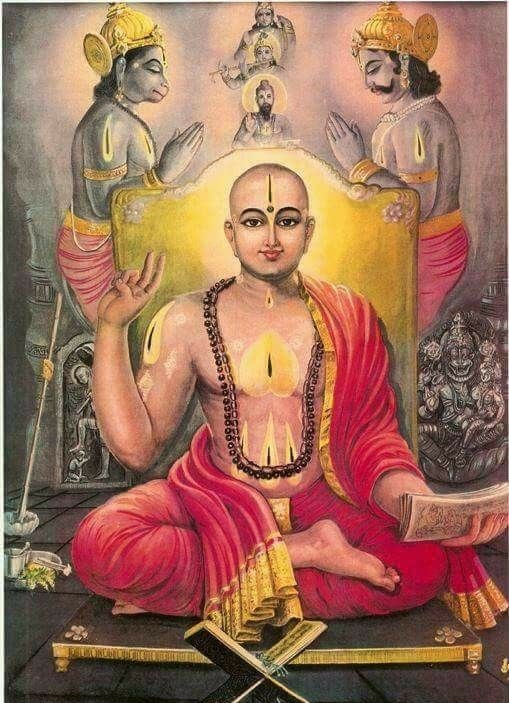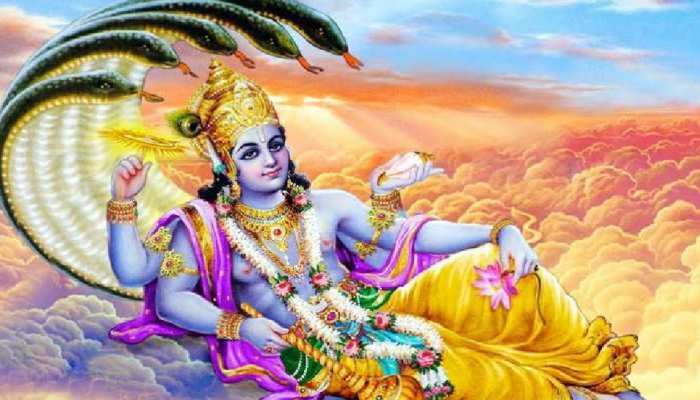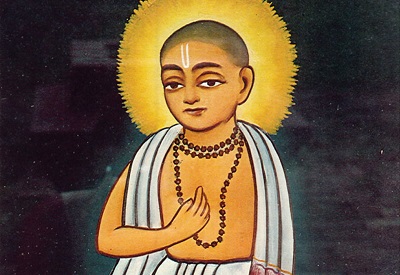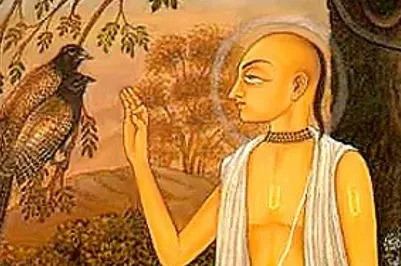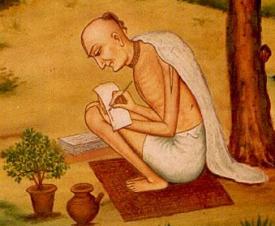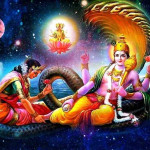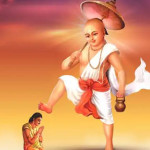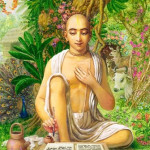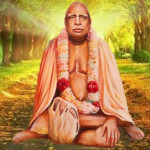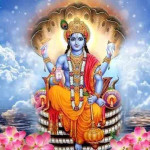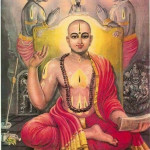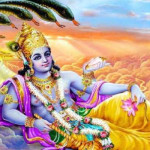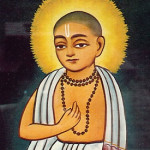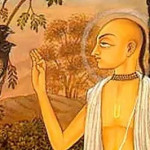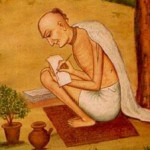Śrīmad-Bhāgvatam – Canto 1
(Q&A Format)
Lords Purusha avatar’s.
The Bhagavad-gita states that the Personality of Godhead Sri Krishna maintains these material universes by extending His plenary expansions. So this Purusha form is the confirmation of the same principle. The original Personality of Godhead Vasudeva, or Lord Krishna, who is famous as the son of King Vasudeva or King Nanda, is full with all opulences, all potencies, all fame, all beauty, all knowledge, and all renunciation. Part of His opulence is manifested as impersonal Brahman, and part of His opulence is manifested as Paramatma. This Purusha feature of the same Personality of Godhead Sri Krishna is the original Paramatma manifestation of the Lord. There are three Purusha features in the material creation, and this form, who is known as the Karanodakasayi Vishnu, is the first of the three. The others are known as the Garbhodakasayi Vishnu and the Ksirodakasayi Vishnu, which we shall know one after another. The innumerable universes are generated from the skin holes of this Karanodakasayi Vishnu, and in each one of the universes, the Lord enters as Garbhodakasayi Vishnu.In the Bhagavad-gita, it is also mentioned that the material world is created at certain intervals and then again destroyed. This creation and destruction are done by the supreme will because of the conditioned souls, or the Nitya-baddha living beings. The Nitya-baddha, or the eternally conditioned souls, have a sense of individuality or ahankara, which dictates them sense enjoyment, which they are unable to have constitutionally. The Lord is the only enjoyer, and all others are enjoyed. The living beings are predominated, enjoyers. But the eternally conditioned souls, forgetful of this constitutional position, have strong aspirations to enjoy. The chance to enjoy matter is given to the conditioned souls in the material world, and side by side they are given the chance to understand their real constitutional position. Those fortunate living entities who catch the truth and surrender unto the lotus feet of Vasudeva after many, many births in the material world join the eternally liberated souls and thus are allowed to enter into the kingdom of Godhead. After this, such fortunate living entities need not come again within the occasional material creation. But those who cannot catch the constitutional truth are again merged into the mahattattva at the time of the annihilation of the material creation. When the creation is again set up, this mahat-tattva is again let loose. This mahat-tattva contains all the ingredients of the material manifestations, including the conditioned souls. Primarily this mahat-tattva is divided into sixteen parts, namely the five gross material elements and the eleven working instruments or senses. It is like the cloud in the clear sky. In the spiritual sky, the effulgence of Brahman has spread all around, and the whole system is dazzling in a spiritual light. The mahat-tattva is assembled in some corner of the vast, unlimited spiritual sky, and the part which is thus covered by the mahat-tattva is called the material sky. This part of the spiritual sky, called the mahat-tattva, is only an insignificant portion of the whole spiritual sky, and within this mahat-tattva, there are innumerable universes. All these universes are collectively produced by the Karanodakasayi Vishnu, called also the Maha-Vishnu, who simply throws His glance to impregnate the material sky.The first purusha is the Karanodakasayi Vishnu. His skin holes innumerable universes have sprung up. In each and every universe, the purusha enters as the Garbhodakasayi Vishnu. He is lying within the half of the universe which is full with the water of His body. And from the navel of Garbhodakasayi Vishnu has sprung the stem of the lotus flower, the birthplace of Brahma, who is the father of all living beings and the master of all the demigod engineers engaged in the perfect design and working of the universal order. Within the stem of the lotus, there are fourteen divisions of planetary systems, and the earthly planets are situated in the middle. Upwards there are other, better planetary systems, and the topmost system is called Brahmaloka or Satyaloka. Downwards from the earthly planetary system, there are seven lower planetary systems inhabited by the asuras and similar other materialistic living beings. From Garbhodakasayi Vishnu there is an expansion of the Ksirodakasayi Vishnu, who is the collective Paramatma of all living beings. He is called Hari, and from Him, all incarnations within the universe are expanded.
Therefore, the conclusion is that the purusha-avatara is manifested in three features — first, the Karanodakasayi who creates aggregate material ingredients in the mahat-tattva, second the Garbhodakasayi who enters in each and every universe, and third the Ksirodakasayi Vishnu who is the Paramatma of every material object, organic or inorganic. One who knows these plenary features of the Personality of Godhead knows Godhead properly, and thus the knower becomes freed from the material conditions of birth, death, old age, and disease, as it is confirmed in Bhagavad-gita, In this sloka, the subject matter of Maha-Vishnu is summarized. The Maha-Vishnu lies down in some part of the spiritual sky by His own free will. Thus He lies on the ocean of Karana, from where He glances over His material nature, and the mahat-tattva is at once created. Thus electrified by the power of the Lord, the material nature at once creates innumerable universes, just as in due course a tree decorates itself with innumerable grown fruits. The seed of the tree is sown by the cultivator, and the tree or creeper in due course becomes manifested with so many fruits. Nothing can take place without a cause. The Karana Ocean is therefore called the Causal Ocean. Karana means “causal.” We should not foolishly accept the atheistic theory of creation. The description of the atheists is given in the Bhagavad-gita. The atheist does not believe in the creator, but he cannot give a good theory to explain the creation. Material nature has no power to create without the power of the purusha, just as a prakrti, or woman, cannot produce a child without the connection of a purusha, or man. The purusha impregnates, and the prakrti delivers. We should not expect milk from the fleshy bags on the neck of a goat, although they look like breastly nipples. Similarly, we should not expect any creative power from the material ingredients; we must believe in the power of the purusha, who impregnates prakrti, or nature. Because the Lord wished to lie down in meditation, the material energy created innumerable universes at once, in each of them the Lord lay down, and thus all the planets and the different paraphernalia were created at once by the will of the Lord. The Lord has unlimited potencies, and thus He can act as He likes by perfect planning, although personally, He has nothing to do. No one is greater than or equal to Him. That is the verdict of the Vedas.
Source: A.C. Bhaktivedanta Swami Prabhupada (2014 edition), “Srimad Bhagavatam”, First Canto, Chapter 3 – Text 1 & 2
Lord Krishna is cent percent.
The summum bonum Krishna is one without a second. He Himself has expanded Himself in various parts, portions and particles as svayam-rupa, svayam-prakasa, tad-ekatma, prabhava, vaibhava, vilasa, avatara, avesa, and jivas, all provided with innumerable energies just suitable to the respective persons and personalities. Learned scholars in transcendental subjects have carefully analyzed the summum bonum, Krishna, to have sixty-four principal attributes. All the expansions or categories of the Lord possess only some percentages of these attributes. But Sri Krishna is the possessor of the attributes cent percent. And His personal expansions such as svayam-prakasa, tad-ekatma up to the categories of the avataras who are all Vishnu-tattva, possess up to ninety-three percent of these transcendental attributes. Lord Shiva, who is neither avatara nor avesa nor in between them, possesses almost eighty-four percent of the attributes. But the jivas, or the individual living beings in different statuses of life, possess up to the limit of seventy-eight percent of the attributes.In the conditioned state of material existence, the living being possesses these attributes in very minute quantity, varying in terms of the pious life of the living being. The most perfect of living beings is Brahma, the supreme administrator of one universe. He possesses seventy-eight percent of the attributes in full. All other demigods have the same attributes in less quantity, whereas human beings possess the attributes in very minute quantity. The standard of perfection for a human being is to develop the attributes up to seventy-eight percent in full. The living being can never possess attributes like Shiva, Vishnu or Lord Krishna. A living being can become godly by developing the seventy-eight-percent transcendental attributes in fullness, but he can never become a God like Shiva, Vishnu or Krishna. He can become a Brahma in due course. The godly living beings who are all residents of the planets in the spiritual sky are eternal associates of God in different spiritual planets called Hari-dhama and Mahesadhama. The abode of Lord Krishna above all spiritual planets is called Krishna Aloka or Goloka Vrndavana, and the perfected living being, by developing seventy-eight percent of the above attributes in fullness, can enter the planet of Krishna Aloka after leaving the present material body.
Source: A.C. Bhaktivedanta Swami Prabhupada (2014 edition), “Srimad Bhagavatam”, First Canto, Chapter 3 – Text 28
Lord Krishna is direct incarnation.
“Bhismadeva says that Shri Krishna is the first Narayana. This is also confirmed by Brahmaji in the Bhagavatam (10.14.14). Krishna is the first Narayana. In the spiritual world (Vaikuntha) there are unlimited numbers of Narayanas, who are all the same Personality of Godhead and are considered to be the plenary expansions of the original Personality of Godhead, Sri Krishna. The first form of the Lord Sri Krishna first expands Himself as the form of Baladeva, and Baladeva expands in so many other forms, such as Sankarsana, Pradyumna, Aniruddha, Vasudeva, Narayana, Purusa, Rama and Nrsimha. All these expansions are one and the same Viṣṇu-tattva, and Sri Krishna is the original source of all the plenary expansions. He is, therefore, the direct Personality of Godhead. He is the creator of the material world, and He is the predominating Deity known as Narayana in all the Vaikuntha planets. Therefore, His movements amongst human beings are another sort of bewilderment. The Lord, therefore, says in the Bhagavad-gita that foolish persons consider Him to be one of the human beings without knowing the intricacies of His movements.Avatara means “one who descends.” All the incarnations of the Lord, including the Lord Himself, descend on the different planets of the material world as also in different species of life to fulfill particular missions. Sometimes He comes Himself, and sometimes His different plenary portions or parts of the plenary portions, or His differentiated portions directly or indirectly empowered by Him, descend on this material world to execute certain specific functions. Originally the Lord is full of all opulences, all prowess, all fame, all beauty, all knowledge, and all renunciation. When they are partly manifested through the plenary portions or parts of the plenary portions, it should be noted that certain manifestations of His different powers are required for those particular functions. When in the room small electric bulbs are displayed, it does not mean that the electric powerhouse is limited by the small bulbs. The same powerhouse can supply power to operate large-scale industrial dynamos with greater volts. Similarly, the incarnations of the Lord display limited powers because so much power is needed at that particular time. For example, Lord Parasurama and Lord Nrsimha displayed unusual opulence by killing the disobedient ksatriyas twenty-one times and killing the greatly powerful atheist Hiranyakasipu. Hiranyakasipu was so powerful that even the demigods in other planets would tremble simply by the unfavorable raising of his eyebrow. The demigods in the higher level of material existence many, many times excel the most well-to-do human beings, in the duration of life, beauty, wealth, paraphernalia, and in all other respects. Still, they were afraid of Hiranyakasipu. Thus we can simply imagine how powerful Hiranyakasipu was in this material world. But even Hiranyakasipu was cut into small pieces by the nails of Lord Nrsimha. This means that anyone materially powerful cannot stand the strength of the Lord’s nails.Similarly, Jamadagnya displayed the Lord’s power to kill all the disobedient kings powerfully situated in their respective states. The Lord’s empowered incarnation Narada and plenary incarnation Varaha, as well as indirectly empowered Lord Buddha, created faith in the mass of people. The incarnations of Rama and Dhanvantari displayed His fame, and Balarama, Mohini, and Vamana exhibited His beauty. Dattatreya, Matsya, Kumara, and Kapila exhibited His transcendental knowledge. Nara and Narayana Rsis exhibited His renunciation. So all the different incarnations of the Lord indirectly or directly manifested different features, but Lord Krishna, the primeval Lord, exhibited the complete features of Godhead, and thus it is confirmed that He is the source of all other incarnations. And the most extraordinary feature exhibited by Lord Sri Krishna was The internal energetic manifestation of His pastimes with the cowherd girls. His pastimes with the gopis are all displays of transcendental existence, bliss, and knowledge, although these are manifested apparently as sex love. The specific attraction of His pastimes with the gopis should never be misunderstood. The Bhagavatam relates these transcendental pastimes in the Tenth Canto. And in order to reach the position to understand the transcendental nature of Lord Krishna’s pastimes with the gopis, the Bhagavatam promotes the student gradually in nine other cantos.According to Srila Jiva Gosvami’s statement, in accordance with authoritative sources, Lord Krishna is the source of all other incarnations. It is not that Lord Krishna has any source of incarnation. All the symptoms of the Supreme Truth in full are present in the person of Lord Sri Krishna, and in the Bhagavad-gita, the Lord emphatically declares that there is no truth greater than or equal to Himself. Although in other places the incarnations are described as Bhagavan because of their specific functions, nowhere are they declared to be the Supreme Personality. In this stanza, the word svayam signifies the supremacy as the summum bonum.”
Source: “A.C. Bhaktivedanta Swami Prabhupada (2014 edition), ” Srimad Bhagavatam”, First Canto, Chapter 9 – Text 18
A.C. Bhaktivedanta Swami Prabhupada (2014 edition), ” Srimad Bhagavatam”, First Canto, Chapter 3 – Text 28″
Why human beings are placed under maya?
The living being is by constitution transcendental to material encagement, but he is now imprisoned by the external energy (Maya), and therefore he thinks himself one of the material products. And due to this unholy contact, the pure spiritual entity suffers material miseries under the modes of material nature. The living entity misunderstands himself to be a material product. This means that the present perverted way of thinking, feeling and willing, under material conditions, is not natural for him. But he has his normal way of thinking, feeling and willing. The living being in his original state is not without thinking, willing and feeling the power. It is also confirmed in the Bhagavad-gita that the actual knowledge of the conditioned soul is now covered by nescience. Thus the theory that a living being is absolute impersonal Brahman is refuted herein. This cannot be, because the living entity has his own way of thinking in his original unconditional state also. The present conditional state is due to the influence of the external energy, which means that the illusory energy takes the initiative while the Supreme Lord is aloof. The Lord does not desire that a living being be illusioned by external energy. The external energy is aware of this fact, but still, she accepts a thankless task of keeping the forgotten soul under illusion by her bewildering influence. The Lord does not interfere with the task of the illusory energy because such performances of the illusory energy are also necessary for reformation of the conditioned soul. An affectionate father does not like his children to be chastised by another agent, yet he puts his disobedient children under the custody of a severe man just to bring them to order. But the all-affectionate Almighty Father at the same time desires relief for the conditioned soul, relief from the clutches of the illusory energy. The king puts the disobedient citizens within the walls of the jail, but sometimes the king, desiring the prisoners’ relief, personally goes there and pleads for reformation, and on his doing so the prisoners are set free. Similarly, the Supreme Lord descends from His kingdom upon the kingdom of illusory energy and personally gives relief in the form of the Bhagavad-gita, wherein He personally suggests that although the ways of illusory energy are very stiff to overcome, one who surrenders unto the lotus feet of the Lord is set free by the order of the Supreme. This surrendering process is the remedial measure for getting relief from the bewildering ways of the illusory energy. The surrendering process is completed by the influence of association. The Lord has suggested, therefore, that by the influence of the speeches of saintly persons who have actually realized the Supreme, men are engaged in His transcendental loving service. The conditioned soul gets a taste for hearing about the Lord, and by such hearing only he is gradually elevated to the platform of respect, devotion, and attachment for the Lord. The whole thing is completed by the surrendering process. Herein also the same suggestion is made by the Lord in His incarnation of Vyasadeva. This means that the conditioned souls are being reclaimed by the Lord both ways, namely by the process of punishment by the external energy of the Lord, and by Himself as the spiritual master within and without. Within the heart of every living being the Lord Himself as the Supersoul (Paramatma) becomes the spiritual master, and from without He becomes the spiritual master in the shape of scriptures, saints and the initiator spiritual master.
Source: A.C. Bhaktivedanta Swami Prabhupada (2014 edition), “Srimad Bhagavatam”, First Canto, Chapter 7 – Text 5
Time (Kala) controls everything.
There is control by the time all over the space within the universe, as there is control by the time all over the planets. All the big gigantic planets, including the sun, are being controlled by the force of air, as the clouds are carried by the force of air. Similarly, the inevitable Kala, or time, controls even the action of the air and other elements. Everything, therefore, is controlled by the supreme Kala, a forceful representative of the Lord within the material world. Thus Yudhishthira should not be sorry for the inconceivable action of time. Everyone has to bear the actions and reactions of time as long as one is within the conditions of the material world. Yudhisthira should not think that he had committed sins in his previous birth and is suffering the consequence. Even the most pious has to suffer the condition of material nature. But a pious man is faithful to the Lord, for he is guided by the bona fide brahmana and Vaisnava following the religious principles. These three guiding principles should be the aim of life. One should not be disturbed by the tricks of eternal time. Even the great controller of the universe, Brahmaji, is also under the control of that time; therefore, one should not grudge being thus controlled by time despite being a true follower of religious principles.
Source: A.C. Bhaktivedanta Swami Prabhupada (2014 edition), “Srimad Bhagavatam”, First Canto, Chapter 9 – Text 14
No one can know the plan of the Lord.
The bewilderment of Maharaja Yudhisthira over his past sinful acts and the resultant sufferings, etc., is completely negated by the great authority Bhisma (one of the twelve authorized persons). Bhisma wanted to impress upon Maharaja Yudhisthira that since time immemorial no one, including such demigods as Siva and Brahma, could ascertain the real plan of the Lord. So what can we understand about it? It is useless also to inquire about it. Even the exhaustive philosophical inquiries of sages cannot ascertain the plan of the Lord. The best policy is simply to abide by the orders of the Lord without argument. The sufferings of the Pandavas were never due to their past deeds. The Lord had to execute the plan of establishing the kingdom of virtue, and therefore His own devotees suffered temporarily in order to establish the conquest of virtue. Bhismadeva was certainly satisfied by seeing the triumph of virtue, and he was glad to see King Yudhisthira on the throne, although he himself fought against him. Even a great fighter like Bhisma could not win the Battle of Kurukshetra because the Lord wanted to show that vice cannot conquer virtue, regardless of who tries to execute it. Bhismadeva was a great devotee of the Lord, but he chose to fight against the Pandavas by the will of the Lord because the Lord wanted to show that a fighter like Bhisma cannot win on the wrong side.
Source: A.C. Bhaktivedanta Swami Prabhupada (2014 edition), “Srimad Bhagavatam”, First Canto, Chapter 9 – Text 16
Why it is important to follow the perfect?
The modern English law of primogeniture, or the law of inheritance by the firstborn, was also prevalent in those days when Maharaja Yudhisthira ruled the earth and seas. In those days the King of Hastinapura (now part of New Delhi) was the emperor of the world, including the seas, up to the time of Maharaja Pariksit, the grandson of Maharaja Yudhisthira. Maharaja Yudhisthira’s younger brothers were acting as his ministers and commanders of state, and there was full cooperation between the perfectly religious brothers of the King. Maharaja Yudhisthira was the ideal king or representative of Lord Sri Krishna to rule over the kingdom of earth and was comparable to King Indra, the representative ruler of the heavenly planets. The demigods like Indra, Candra, Surya, Varuna, and Vayu are representative kings of different planets of the universe, and similarly, Maharaja Yudhisthira was also one of them, ruling over the kingdom of the earth. Maharaja Yudhisthira was not a typically unenlightened political leader of modern democracy. Maharaja Yudhisthira was instructed by Bhismadeva and the infallible Lord also, and therefore he had full knowledge of everything in perfection.
The modern elected executive head of a state is just like a puppet because he has no kingly power. Even if he is enlightened like Maharaja Yudhisthira, he cannot do anything out of his own good will due to his constitutional position. Therefore, there are so many states over the earth quarreling because of ideological differences or other selfish motives. But a king like Maharaja Yudhisthira had no ideology of his own. He had but to follow the instructions of the infallible Lord and the Lord’s representative and the authorized agent, Bhismadeva. It is instructed in the sastras that one should follow the great authority and the infallible Lord without any personal motive and manufactured ideology. Therefore, it was possible for Maharaja Yudhisthira to rule the whole world, including the seas because the principles were infallible and universally applicable to everyone. The conception of one world state can only be fulfilled if we can follow the infallible authority. An imperfect human being cannot create an ideology acceptable to everyone. Only the perfect and the infallible can create a program which is applicable at every place and can be followed by all in the world. It is the person who rules and not the impersonal government. If the person is perfect, the government is perfect. If the person is a fool, the government is a fool’s paradise. That is the law of nature. There are so many stories of imperfect kings or executive heads. Therefore, the executive head must be a trained person like Maharaja Yudhisthira, and he must have the full autocratic power to rule over the world. The conception of a world state can take shape only under the regime of a perfect king like Maharaja Yudhisthira. The world was happy in those days because there were kings like Maharaja Yudhisthira to rule over the world.
Source: A.C. Bhaktivedanta Swami Prabhupada (2014 edition), “Srimad Bhagavatam”, First Canto, Chapter 10 – Text 3
Devotional service to the Lord is uncheckable in all circumstances.
We may not hate even the prostitutes if they are devotees of the Lord. Even to date, there are many prostitutes in great cities of India who are sincere devotees of the Lord. By tricks of chance, one may be obliged to adopt a profession which is not very adorable in society, but that does not hamper one in executing devotional service to the Lord. Devotional service to the Lord is uncheckable in all circumstances. It is understood herewith that even in those days, about five thousand years ago, there were prostitutes in a city like Dvaraka, where Lord Krishna resided. This means that prostitutes are necessary citizens for the proper upkeep of society. The government opens wine shops, but this does not mean that the government encourages the drinking of wine. The idea is that there is a class of men who will drink at any cost, and it has been experienced that prohibition in great cities encouraged illicit smuggling of wine. Similarly, men who are not satisfied at home require such concessions, and if there is no prostitute, then such low men will induce others into prostitution. It is better that prostitutes be available in the marketplace so that the sanctity of society can be maintained. It is better to maintain a class of prostitutes than to encourage prostitutes within society. The real reformation is to enlighten all people to become devotees of the Lord, and that will check all kinds of deteriorating factors of life.
Sri Bilvamangala Thakura, a great acarya of the Visnusvami Vaisnava sect, in his householder life was overly attached to a prostitute who happened to be a devotee of the Lord. One night when the Thakura came to Cintamani’s house in torrents of rain and thunder, Cintamani was astonished to see how the Thakura could come on such a dreadful night after crossing a foaming river which was full of waves. She said to Thakura Bilvamangala that his attraction for the flesh and bone of an insignificant woman like her would be properly utilized if it could be diverted to the devotional service of the Lord to achieve attraction for the transcendental beauty of the Lord. It was a momentous hour for the Thakura, and he took a turn towards spiritual realization by the words of a prostitute. Later on, the Thakura accepted the prostitute as his spiritual master, and in several places of his literary works he has glorified the name of Cintamani, who showed him the right path.
In the Bhagavad-gita (9.32) the Lord says, “O son of Prtha, even the low-born candalas and those who are born in a family of unbelievers, and even the prostitutes, shall attain perfection of life if they take shelter of unalloyed devotional service to Me, because in the path of devotional service there are no impediments due to degraded birth and occupation. The path is open for everyone who agrees to follow it.”
Source: A.C. Bhaktivedanta Swami Prabhupada (2014 edition), “Srimad Bhagavatam”, First Canto, Chapter 11 – Text 19
Anything material seen for a number of times ultimately becomes unattractive by the law of satiation.
When the ladies of the city of Dvaraka got up on the roofs of their palaces, they never thought that they had previously many times seen the beautiful body of the infallible Lord. This indicates that they had no satiation in desiring to see the Lord. Anything material is seen for a number of times ultimately becomes unattractive by the law of satiation. The law of satiation acts materially, but there is no scope for it in the spiritual realm. The word infallible is significant here because although the Lord has mercifully descended on earth, He is still infallible. The living entities are fallible because when they come in contact with the material world they lack their spiritual identity, and thus the body materially obtained becomes subjected to birth, growth, transformation, situation, deterioration, and annihilation under the laws of nature. The Lord’s body is not like that. He descends as He is and is never under the laws of the material modes. His body is the source of everything that is, the reservoir of all beauties beyond our experience. No one, therefore, is satiated by seeing the transcendental body of the Lord because there are always manifestations of newer and newer beauties. The transcendental name, form, qualities, entourage, etc., are all spiritual manifestations, and there is no satiation in chanting the holy name of the Lord, there is no satiation in discussing the qualities of the Lord, and there is no limitation of the entourage of the Lord. He is the source of all and is limitless.
Source: A.C. Bhaktivedanta Swami Prabhupada (2014 edition), “Srimad Bhagavatam”, First Canto, Chapter 11 – Text 25
The activities of the world are being carried on by the central attraction of male & female.
The path of salvation or the path going back to Godhead always forbids the association of women, and the complete Sanatana-dharma or varnasrama-dharma scheme forbids or restricts association with women. How, then, can one be accepted as the Supreme Personality of Godhead who is addicted to more than sixteen thousand wives? This question may be relevantly raised by inquisitive persons really anxious to know about the transcendental nature of the Supreme Lord. And to answer such questions, the sages at Naimisaranya have discussed the transcendental character of the Lord in this and in following verses. It is clear herein that the feminine attractive features which can conquer Cupid or even the supermost tolerant Lord Siva could not conquer the senses of the Lord. Cupid’s business is to invoke mundane lust. The whole universe is moving being agitated by Cupid’s arrow. The activities of the world are being carried on by the central attraction of male and female. A male is searching after a mate to his liking, and the female is looking after a suitable male. That is the way of material stimulus. And as soon as a male is combined with a female, the material bondage of the living being is at once tightly interlocked by sex relation, and as a result of this, both the male’s and female’s attraction for sweet home, motherland, bodily offspring, society and friendship and accumulation of wealth becomes the illusory field of activities, and thus a false but indefatigable attraction for the temporary material existence, which is full of miseries, is manifest. Those who are, therefore, on the path of salvation for going back home back to Godhead, are especially advised by all scriptural instruction to become free from such paraphernalia of material attraction. And that is possible only by the association of the devotees of the Lord, who are called the mahatmas. Cupid throws his arrow upon the living beings to make them mad after the opposite sex, whether the party is actually beautiful or not. Cupid’s provocations are going on, even among beastly societies who are all ugly-looking in the estimation of the civilized nations. Thus Cupid’s influence is exerted even amongst the ugliest forms, and what to speak of the most perfect beauties. Lord Siva, who is considered to be most tolerant, was also struck by Cupid’s arrow because he also became mad after the Mohini incarnation of the Lord and acknowledged himself to be defeated. Cupid, however, was himself captivated by the grave and exciting dealings of the goddesses of fortune, and he voluntarily gave up his bow and arrow in a spirit of frustration. Such was the beauty and attraction of the queens of Lord Krishna. Yet they could not disturb the transcendental senses of the Lord. This is because the Lord is all-perfect atmarama, or self-sufficient. He does not require anyone’s extraneous help for His personal satisfaction. Therefore, the queens could not satisfy the Lord by their feminine attractiveness, but they satisfied Him by their sincere affection and service. Only by unalloyed transcendental loving service could they satisfy the Lord, and the Lord was pleased to treat them as wives in reciprocation. Thus being satisfied by their unalloyed service only, the Lord reciprocated the service just like a devout husband. Otherwise, He had no business becoming the husband of so many wives. He is the husband of everyone, but to one who accepts Him as such, He reciprocates. This unalloyed affection for the Lord is never to be compared to mundane lust. It is purely transcendental. And the grave dealings, which the queens displayed in natural feminine ways, were also transcendental because the feelings were expressed out of transcendental ecstasy. It is already explained in the previous verse that the Lord appeared like a mundane husband, but factually His relation with His wives was transcendental, pure and unconditioned by the modes of material nature.
Source: A.C. Bhaktivedanta Swami Prabhupada (2014 edition), “Srimad Bhagavatam”, First Canto, Chapter 11 – Text 36
The common materialistic conditioned souls speculate that the Lord is one of them.
The word abudhah is significant here. Due to ignorance only, the foolish mundane wranglers misunderstand the Supreme Lord and spread their foolish imaginations amongst innocent persons by propaganda. The Supreme Lord Sri Krishna is the original primeval Personality of Godhead, and when He was personally present before the eyes of everyone, He displayed full-fledged divine potency in every field of activities. He is completely independent to act however He likes, but all His actions are full of bliss, knowledge and eternity. Only the foolish mundaners misunderstand Him, unaware of His eternal form of knowledge and bliss, which is confirmed in the Bhagavad-gita and Upanisads. His different potencies work in a perfect plan of natural sequence, and doing everything by the agency of His different potencies, He remains eternally the supreme independent. When He descends on the material world by His causeless mercy to different living beings, He does so by His own potency. He is not subject to any condition of the material modes of nature, and He descends as He is originally. The mental speculators misunderstand Him as the Supreme Person, and they consider His impersonal features as inexplicable Brahman to be all. Such a conception is also the product of conditioned life because they cannot go beyond their own personal capacity.
Therefore, one who considers the Lord on the level of one’s limited potency is only a common man. Such a man cannot be convinced that the Personality of Godhead is always unaffected by the modes of material nature. He cannot understand that the sun is always unaffected by infectious matter. The mental speculators compare everything from the standpoint of experimental knowledge of their own selves. Thus when the Lord is found to act like an ordinary person in matrimonial bondage, they consider Him to be like one of them, without considering that the Lord can at once marry sixteen thousand wives or more. Due to a poor fund of knowledge, they accept one side of the picture while disbelieving the other. This means that due to ignorance only they always think of Lord Krishna as like themselves and make their own conclusions, which are absurd and unauthentic from the version of the Srimad-Bhagavatam.
Source: A.C. Bhaktivedanta Swami Prabhupada (2014 edition), “Srimad Bhagavatam”, First Canto, Chapter 11 – Text 37
Astronomical influence on our life.
Astronomical calculations of stellar influences upon a living being are not suppositions, but are factual, as confirmed in Srimad-Bhagavatam. Every living being is controlled by the laws of nature at every minute, just as a citizen is controlled by the influence of the state. The state laws are grossly observed, but the laws of material nature, being subtle to our gross understanding, cannot be experienced grossly. As stated in the Bhagavad-gita (3.9), every action of life produces another reaction, which is binding upon us, and only those who are acting on behalf of Yajna (Vishnu) are not bound by reactions. Our actions are judged by the higher authorities, the agents of the Lord, and thus we are awarded bodies according to our activities. The law of nature is so subtle that every part of our body is influenced by the respective stars, and a living being obtains his working body to fulfil his terms of imprisonment by the manipulation of such astronomical influence. A man’s destiny is therefore ascertained by the birth time constellation of stars, and a factual horoscope is made by a learned astrologer. It is a great science, and misuse of science does not make it useless.
Maharaja Pariksit or even the Personality of Godhead appears in certain constellations of good stars, and thus the influence is exerted upon the body thus born at an auspicious moment. The most auspicious constellation of stars takes place during the appearance of the Lord in this material world, and it is specifically called Jayanti, a word not to be abused for any other purposes. Maharaja Pariksit was not only a great ksatriya emperor but also a great devotee of the Lord. Thus he cannot take his birth at an inauspicious moment. As a proper place and time are selected to receive a respectable personage, so also to receive such a personality as Maharaja Pariksit, who was especially cared for by the Supreme Lord, a suitable moment is chosen when all good stars assembled together to exert their influence upon the King. Thus he took his birth just to be known as the great hero of Srimad- Bhagavatam. This suitable arrangement of astral influences is never a creation of man’s will but is the arrangement of the superior management of the agency of the Supreme Lord. Of course, the arrangement is made according to the good or bad deeds of the living being. Herein lies the importance of pious acts performed by the living being. Only by pious acts can one be allowed to get good wealth, good education and beautiful features. The samskaras of the school of sanatana-dharma (man’s eternal engagement) are highly suitable for creating an atmosphere for taking advantage of good stellar influences, and therefore garbhadhana-samskara, or the first seedling purificatory process prescribed for the higher castes, is the beginning of all pious acts to receive a good pious and intelligent class of men in human society. There will be peace and prosperity in the world due to the good and sane population only; there are hell and disturbance only because of the unwanted, insane populace addicted to sex indulgence.
Source: A.C. Bhaktivedanta Swami Prabhupada (2014 edition), “Srimad Bhagavatam”, First Canto, Chapter 12 – Text 12
Lord Krishna gave knowledge of Bhagavad-gita to the sun-god.
The Vedic literature is taught in higher planets also, as there is reference in the Bhagavad-gita (4.1) about the teachings to the sun-god (Vivasvan) by the Lord, and such lessons are transferred by disciplic succession, as it was done by the sun-god to his son Manu, and from Manu to Maharaja Iksvaku. There are fourteen Manus in one day of Brahma, and the Manu referred to herein is the seventh Manu, who is one of the prajapatis (those who create progeny), and he is the son of the sun-god. He is known as the Vaivasvata Manu. He had ten sons, and Maharaja Iksvaku is one of them. Maharaja Iksvaku also learned bhakti-yoga as taught in the Bhagavad-gita from his father, Manu, who got it from his father, the sun-god. Later on, the teaching of the Bhagavad-gita came down by disciplic succession from Maharaja Iksvaku, but in course of time the chain was broken by unscrupulous persons, and therefore it again had to be taught to Arjuna on the Battlefield of Kurukshetra. So all the Vedic literature are current from the very beginning of the creation of the material world, and thus the Vedic literature is known as apauruseya (not made by man). The Vedic knowledge was spoken by the Lord and first heard by Brahma, the first created living being within the universe.
Source: A.C. Bhaktivedanta Swami Prabhupada (2014 edition), “Srimad Bhagavatam”, First Canto, Chapter 12 – Text 19
Everyone is under the control of the Supreme Lord.
Every living being, either in this material world or in the spiritual world, is under the control of the Supreme Lord, the Personality of Godhead. Beginning from Brahmaji, the leader of this universe, down to the insignificant ant, all are abiding by the order of the Supreme Lord. Thus the constitutional position of the living being is subordination under the control of the Lord. The foolish living being, especially man, artificially rebels against the law of the Supreme and thus becomes chastised as an asura or lawbreaker. A living being is placed in a particular position by the order of the Supreme Lord, and he is again shifted from that place by the order of the Supreme Lord or His authorized agents. Brahma, Shiva, Indra, Candra, Maharaja Yudhisthira or, in modern history, Napoleon, Akbar, Alexander, Gandhi, Shubhash, and Nehru all are servants of the Lord, and they are placed in and removed from their respective positions by the supreme will of the Lord. None of them is independent. Even though such men or leaders rebel so as not to recognize the supremacy of the Lord, they are put under still more rigorous laws of the material world by different miseries. Only the foolish man, therefore, says that there is no God. Maharaja Yudhisthira was being convinced of this naked truth because he was greatly overwhelmed by the sudden departure of his old uncles and aunt. Maharaja Dhrtarastra was placed in that position according to his past deeds; he had already suffered or enjoyed the benefits accrued to him in the past, but due to his good luck, somehow or other he had a good younger brother, Vidura, and by his instruction he left to achieve salvation by closing all accounts in the material world. Ordinarily one cannot change the course of one’s due happiness and distress by the plan. Everyone has to accept them as they come under the subtle arrangement of Kala, or invincible time. There is no use trying to counteract them. The best thing is, therefore, that one should endeavor to achieve salvation, and this prerogative is given only to man because of his developed condition of mental activities and intelligence. Only for man are there different Vedic instructions for the attainment of salvation during the human form of existence. One who misuses this opportunity of advanced intelligence is verily condemned and put into different types of miseries, either in this present life or in the future. That is the way the Supreme controls everyone.
Source: A.C. Bhaktivedanta Swami Prabhupada (2014 edition), “Srimad Bhagavatam”, First Canto, Chapter 13 – Text 41
Only Lord can change resultant actions of the law of karma.
We must know for certain that the particular position in which we are now set up is an arrangement of the supreme will in terms of our own acts in the past. The Supreme Lord is present as the localized Paramatma in the heart of every living being, as it is said in the Bhagavad-gita (13.23), and therefore he knows everything of our activities in every stage of our lives. He rewards the reactions of our actions by placing us in some particular place. A rich man gets his son born with a silver spoon in his mouth, but the child who came as the rich man’s son deserved such a place, and therefore he is placed there by the will of the Lord. And at a particular moment when the child has to be removed from that place, he is also carried by the will of the Supreme, even if the child or the father does not wish to be separated from the happy relation. The same thing happens in the case of a poor man also. Neither rich man nor poor man has any control over such meetings or separations of living beings. The example of a player and his playthings should not be misunderstood. One may argue that since the Lord is bound to award the reactionary results of our own actions, the example of a player cannot be applied. But it is not so. We must always remember that the Lord is the supreme will, and He is not bound by any law. Generally, the law of karma is that one is awarded the result of one’s own actions, but in special cases, by the will of the Lord, such resultant actions are changed also. But this change can be affected by the will of the Lord only and no other. Therefore, the example of the player cited in this verse is quite appropriate, for the Supreme Will is absolutely free to do whatever He likes, and because He is all-perfect, there is no mistake in any of His actions or reactions. These changes of resultant actions are especially rendered by the Lord when a pure devotee is involved. It is assured in the Bhagavad-gita (9.30-31) that the Lord saves a pure devotee who has surrendered unto Him without reservation from all sorts of reactions of sins, and there is no doubt about this. There are hundreds of examples of reactions changed by the Lord in the history of the world. If the Lord is able to change the reactions of one’s past deeds, then certainly He is not Himself bound by any action or reaction of His own deeds. He is perfect and transcendental to all laws.
Source: A.C. Bhaktivedanta Swami Prabhupada (2014 edition), “Srimad Bhagavatam”, First Canto, Chapter 13 – Text 43
The weak are the subsistence of the strong. Why we should offer food to Lord? Can we offer meat to Lord?
A systematic law of subsistence in the struggle for existence is there by the supreme will, and there is no escape for anyone by any amount of planning. The living beings who have come to the material world against the will of the Supreme Being are under the control of a supreme power called Maya-Sakti, the deputed agent of the Lord, and this daivi maya is meant to pinch the conditioned souls by threefold miseries, one of which is explained here in this verse: the weak are the subsistence of the strong. No one is strong enough to protect himself from the onslaught of a stronger, and by the will of the Lord, there are systematic categories of the weak, the stronger and the strongest. There is nothing to be lamented if a tiger eats a weaker animal, including a man because that is the law of the Supreme Lord. But although the law states that a human being must subsist on another living being, there is the law of good sense also, for the human being is meant to obey the laws of the scriptures. This is impossible for other animals. The human being is meant for self-realization, and for that purpose, he is not to eat anything which is not first offered to the Lord. The Lord accepts from His devotee all kinds of food preparations made of vegetables, fruits, leaves, and grains. Fruits, leaves, and milk in different varieties can be offered to the Lord, and after the Lord accepts the foodstuff, the devotee can partake of the prasada, by which all suffering in the struggle for existence will be gradually mitigated. This is confirmed in the Bhagavad-gita (9.26). Even those who are accustomed to eats animals can offer foodstuff, not to the Lord directly, but to an agent of the Lord, under certain conditions of religious rites. Injunctions of the scriptures are meant not to encourage the eaters of animals, but to restrict them by regulated principles.
The living being is the source of subsistence for other, stronger living beings. No one should be very anxious for his subsistence in any circumstances because there are living beings everywhere, and no living being starves for want of food at any place. Maharaja Yudhisthira is advised by Narada not to worry about his uncles’ suffering for want of food, for they could live on vegetables available in the jungles as prasada of the Supreme Lord and thus realize the path of salvation.
Exploitation of the weaker living being by the stronger is the natural law of existence; there is always an attempt to devour the weak in different kingdoms of living beings. There is no possibility of checking this tendency by any artificial means under material conditions; it can be checked only by awakening the spiritual sense of the human being by the practice of spiritual regulations. The spiritual regulative principles, however, do not allow a man to slaughter weaker animals on one side and teach others peaceful coexistence. If a man does not allow the animals peaceful coexistence, how can he expect peaceful existence in human society? The blind leaders must, therefore, understand the Supreme Being and then try to implement the kingdom of God. The kingdom of God, or Rama-Rajya, is impossible without the awakening of God consciousness in the mass mind of the people of the world.
Source: A.C. Bhaktivedanta Swami Prabhupada (2014 edition), “Srimad Bhagavatam”, First Canto, Chapter 13 – Text 47
There is no difference between the Lord’s Self and the Lord’s transcendental body.
Lord Krishna as He appears once every twenty-four hours of Brahma’s time (or after a lapse of 8,640,000,000 solar years) in each and every universe and all His transcendental pastimes are displayed in each and every universe in a routine spool. But in that routine spool the functions of Lord Krishna, Lord Vasudeva, etc., are complex problems for the layman. There is no difference between the Lord’s Self and the Lord’s transcendental body. The expansions execute differential activities. When the Lord, however, appears in His person as Lord Sri Krishna, His other plenary portions also join in Him by His inconceivable potency called yogamaya, and thus the Lord Krishna of Vrndavana is different from the Lord Krishna of Mathura or the Lord Krishna of Dvaraka. The Virat-rupa of Lord Krishna is also different from Him, by His inconceivable potency. The viratrupa exhibited on the Battlefield of Kuruksetra is the material conception of His form. Therefore it should be understood that when Lord Krishna was apparently killed by the bow and arrow of the hunter, the Lord left His so-called material body in the material world. The Lord is kaivalya, and for Him, there is no difference between matter and spirit because everything is created from Him. Therefore His quitting one sort of body or accepting another body does not mean that He is like the ordinary living being. All such activities are simultaneously one and different by His inconceivable potency. When Maharaja Yudhisthira was lamenting the possibility of His disappearance, it was just in pursuance of a custom of lamenting the disappearance of a great friend, but factually the Lord never quits His transcendental body, as is misconceived by less intelligent persons. Such less intelligent persons have been condemned by the Lord Himself in Bhagavad-gita, and they are known as the mudhas. That the Lord left His body means that He left again His plenary portions in the respective dhamas (transcendental abodes), as He left His Virat-rupa in the material world.
Source: A.C. Bhaktivedanta Swami Prabhupada (2014 edition), “Srimad Bhagavatam”, First Canto, Chapter 14 – Text 8
Material prosperity depends on the mercy of the Lord.
Material prosperity consists of a good wife, good home, sufficient land, good children, aristocratic family relations, victory over competitors and, by pious work, attainment of accommodations in the higher celestial planets for better facilities of material amenities. These facilities are earned not only by one’s hard manual labor or by unfair means, but by the mercy of the Supreme Lord. Prosperity earned by one’s personal endeavor also depends on the mercy of the Lord. Personal labor must be there in addition to the Lord’s benediction, but without the Lord’s benediction, no one is successful simply by personal labor. The modernized man of Kali-yuga believes in a personal endeavor and denies the benediction of the Supreme Lord. Even a great sannyasi of India delivered speeches in Chicago protesting the benedictions of the Supreme Lord. But as far as Vedic sastras are concerned, as we find in the pages of Srimad- Bhagavatam, the ultimate sanction for all success rests in the hands of the Supreme Lord. Maharaja Yudhisthira admits this truth in his personal success, and it behooves one to follow in the footsteps of a great king and devotee of the Lord to make life a full success. If one could achieve success without the sanction of the Lord then no medical practitioner would fail to cure a patient. Despite the most advanced treatment of a suffering patient by the most up-to-date medical practitioner, there is death, and even in the most hopeless case, without medical treatment, a patient is cured astonishingly. Therefore the conclusion is that God’s sanction is the immediate cause for all happenings, good or bad. Any successful man should feel grateful to the Lord for all he has achieved.
Source: A.C. Bhaktivedanta Swami Prabhupada (2014 edition), “Srimad Bhagavatam”, First Canto, Chapter 14 – Text 9
The binding effects of the three modes of material nature are never to be conquered.
Material advancement of civilization means advancement of the reactions of the threefold miseries due to celestial influence, earthly reactions and bodily or mental pains. By the celestial influence of the stars, there are many calamities like excessive heat, cold, rains or no rains, and the aftereffects are famine, disease, an epidemic. The aggregate result is an agony of the body and the mind. Man-made material science cannot do anything to counteract these threefold miseries. They are all punishments from the superior energy of Maya under the direction of the Supreme Lord. Therefore our constant touch with the Lord by devotional service can give us relief without our being disturbed in the discharge of our human duties. The asuras, however, who do not believe in the existence of God, make their own plans to counteract all these threefold miseries, and so they meet with failures every time. The Bhagavad-gita (7.14) clearly states that the reaction of material energy is never to be conquered, because of the binding effects of the three modes. They can simply be overcome by one who surrenders fully in devotion under the lotus feet of the Lord.
Source: A.C. Bhaktivedanta Swami Prabhupada (2014 edition), “Srimad Bhagavatam”, First Canto, Chapter 14 – Text 10
Not a blade of grass moves without the will of the Lord.
According to the anthropologists, there is nature’s law of struggle for existence and survival of the fittest. But they do not know that behind the law of nature is the supreme direction of the Supreme Personality of Godhead. In the Bhagavad-gita, it is confirmed that the law of nature is executed under the direction of the Lord. Whenever, therefore, there is peace in the world, it must be known that it is due to the goodwill of the Lord. And whenever there is upheaval in the world, it is also due to the supreme will of the Lord. Not a blade of grass moves without the will of the Lord. Whenever, therefore, there is disobedience of the established rules enacted by the Lord, there is the war between men and nations. The surest way to the path of peace, therefore, is dovetailing everything to the established rule of the Lord.
The established rule is that whatever we do, whatever we eat, whatever we sacrifice or whatever we give in charity must be done to the full satisfaction of the Lord. No one should do anything, eat anything, sacrifice anything or give anything in charity against the will of the Lord. Discretion is the better part of valor, and one must learn how to discriminate between actions which may be pleasing to the Lord and those which may not be pleasing to the Lord. The action is thus judged by the Lord’s pleasure or displeasure. There is no room for personal whims; we must always be guided by the pleasure of the Lord. Such action is called yogah karmasu kausalam, or actions performed which are linked with the Supreme Lord. That is the art of doing a thing perfectly.
Source: A.C. Bhaktivedanta Swami Prabhupada (2014 edition), “Srimad Bhagavatam”, First Canto, Chapter 15 – Text 24
The human form is a special gift of material nature.
The less intelligent do not know the real value of the human form of life. The human form is a special gift of material nature in the course of her enforcing stringent laws of miseries upon the living being. It is a chance to achieve the highest boon of life, namely to get out of the entanglement of repeated birth and death. The intelligent take care of this important gift by strenuously endeavoring to get out of the entanglement. But the less intelligent are lazy and unable to evaluate the gift of the human body to achieve liberation from the material bondage; they become more interested in so-called economic development and work very hard throughout life simply for the sense enjoyment of the temporary body. Sense enjoyment is also allowed to the lower animals by the law of nature, and thus a human being is also destined to a certain amount of sense enjoyment according to his past or present life. But one should definitely try to understand that sense of enjoyment is not the ultimate goal of human life. Herein it is said that during the daytime one works “for nothing” because the aim is nothing but sense enjoyment. We can particularly observe how the human being is engaged for nothing in the great cities and industrial towns. There are so many things manufactured by human energy, but they are all meant for sense enjoyment, and not for getting out of material bondage. And after working hard during the daytime, a tired man either sleeps or engages in sex habits at night. That is the program of materialistic civilized life for the less intelligent. Therefore they are designated herein as lazy, unfortunate and short-lived.
Source: A.C. Bhaktivedanta Swami Prabhupada (2014 edition), “Srimad Bhagavatam”, First Canto, Chapter 16 – Text 9
Symptoms of the age of kali.
The people of the world in this age of Kali are always full of anxieties. Everyone is diseased with some kind of ailment. From the very faces of the people of this age, one can find out the index of the mind. Everyone feels the absence of his relative who is away from home. The particular symptom of the age of Kali is that no family is now blessed to live together. To earn a livelihood, the father lives at a place far away from the son, or the wife lives far away from the husband and so on. There are sufferings from internal diseases, separation from those near and dear, and anxieties for maintaining the status quo. These are but some important factors which make the people of this age always unhappy.
With the progress of the age of Kali, four things particularly, namely the duration of life, mercy, the power of recollection, and moral or religious principles will gradually diminish. Since Dharma, or the principles of religion, would be lost in the proportion of three out of four, the symbolic bull was standing on one leg only. When three-fourths of the population of the whole world become irreligious, the situation is converted into hell for the animals. In the age of Kali, godless civilizations will create so many so-called religious societies in which the Personality of Godhead will be directly or indirectly defied. And thus faithless societies of men will make the world uninhabitable for the saner section of people. There are gradations of human beings in terms of proportionate faith in the Supreme Personality of Godhead. The first-class faithful men are the Vaisnavas and the Brahmanas, then the ksatriyas, then the Vaisyas, then the sudras, then the mlecchas, the yavanas and at last the candalas. The degradation of the human instinct begins from the mlecchas, and the candala state of life is the last word in human degradation. All the above terms mentioned in the Vedic literature are never meant for any particular community or birth. They are different qualifications of human beings in general. There is no question of birthright or community. One can acquire the respective qualifications by one’s own efforts, and thus the son of a Vaisnava can become a mleccha, or the son of a candala can become more than a brahmana, all in terms of their association and intimate relation with the Supreme Lord.
The meat-eaters are generally called mlecchas. But all meat-eaters are not mlecchas. Those who accept meat in terms of scriptural injunctions are not mlecchas, but those who accept meat without restriction are called mlecchas. Beef is forbidden in the scriptures, and the bulls and cows are offered special protection by followers of the Vedas. But in this age of Kali, people will exploit the body of the bull and the cow as they like, and thus they will invite sufferings of various types. The people of this age will not perform any sacrifice. The mleccha population will care very little for performances of sacrifices, although performance of sacrifice is essential for persons who are materially engaged in sense enjoyment. In the Bhagavad-gita performance of sacrifices is strongly recommended (Bg. 3.14-16). The living beings are created by the creator Brahma, and just to maintain the created living being progressively towards the path back to Godhead, the system of performing sacrifice is also created by him. The system is that living beings live on the produce of grains and vegetables, and by eating such foodstuff they get vital power of the body in the shape of blood and semen, and from blood and semen one living being is able to create other living beings. But the production of grains, grass, etc. becomes possible by rain, and this rain is made to shower properly by performance of recommended sacrifices. Such sacrifices are directed by the rites of the Vedas, namely Sama, Yajur, Rg and Atharva. In the Manu-smrti it is recommended that by offerings of sacrifice on the altar of the fire, the sun-god is pleased. When the sun-god is pleased, he properly collects water from the sea, and thus sufficient clouds collect on the horizon and rains fall. After sufficient rains fall, there is sufficient production of grains for men and all animals, and thus there is energy in the living being for progressive activity. The mlecchas, however, make plans to install slaughterhouses for killing bulls and cows along with other animals, thinking that they will prosper by increasing the number of factories and live on animal food without caring for performance of sacrifices and production of grains. But they must know that even for the animals they must produce grass and vegetables, otherwise the animals cannot live. And to produce grass for the animals, they require sufficient rains. Therefore they have to depend ultimately on the mercy of the demigods like the sun-god, Indra and Candra, and such demigods must be satisfied by performances of sacrifice. This material world is a sort of prison house, as we have several times mentioned. The demigods are the servants of the Lord who see to the proper upkeep of the prison house. These demigods want to see that the rebel living beings, who want to survive faithlessly, are gradually turned towards the supreme power of the Lord. Therefore, the system of offering sacrifice is recommended in the scriptures. The materialistic men want to work hard and enjoy fruitive results for sense enjoyment. Thus they are committing many types of sins at every step of life. Those, however, who are consciously engaged in the devotional service of the Lord are transcendental to all varieties of sin and virtue. Their activities are free from the contamination of the three modes of material nature. For the devotees there is no need for performance of prescribed sacrifices because the very life of the devotee is a symbol of sacrifice. But persons who are engaged in fruitive activities for sense enjoyment must perform the prescribed sacrifices because that is the only means to get free from the reaction of all sins committed by fruitive workers. Sacrifice is the means for counteracting such accumulated sins. The demigods are pleased when such sacrifices are performed, just as prison officers are satisfied when the prisoners are turned into obedient subjects. Lord Caitanya, however, has recommended only one yajna, or sacrifice, called the sankirtana-yajna, the chanting of Hare Krishna, in which everyone can take part. Thus both devotees and fruitive workers can derive equal benefit from the performances of sankirtana-yajna.
There are some necessities of life on a par with those of the lower animals, and they are eating, sleeping, fearing and mating. These bodily demands are for both the human beings and animals. But the human being has to fulfill such desires not like animals, but like a human being. A dog can mate with a bitch before the public eyes without hesitation, but if a human being does so the act will be considered a public nuisance, and the person will be criminally prosecuted. Therefore for the human being, there are some rules and regulations, even for fulfilling common demands. The human society avoids such rules and regulations when it is bewildered by the influence of the age of Kali. In this age, people are indulging in such necessities of life without following the rules and regulations, and this deterioration of social and moral rules is certainly lamentable because of the harmful effects of such beastly behavior. In this age, the fathers and the guardians are not happy with the behavior of their wards. They should know that so many innocent children are victims of bad association awarded by the influence of this age of Kali. We know from Srimad-Bhagavatam that Ajamila, an innocent son of a brahmana, was walking down a road and saw a sudra pair sexually embracing. This attracted the boy, and later on, the boy became a victim of all debaucheries. From a pure brahmana, he fell down to the position of a wretched urchin, and it was all due to bad association. There was but one victim like Ajamila in those days, but in this age of Kali, the poor innocent students are daily victims of cinemas which attract men only for sex indulgence. The so-called administrators are all untrained in the affairs of a ksatriya. The ksatriyas are meant for administration, as the Brahmanas are meant for knowledge and guidance. The word ksatra-bandhu refers to the so-called administrators or persons promoted to the post of the administrator without proper training by culture and tradition. Nowadays they are promoted to such exalted posts by the votes of the people who are themselves fallen in the rules and regulations of life. How can such people select a proper man when they are themselves fallen in the standard of life? Therefore, by the influence of the age of Kali, everywhere, politically, socially or religiously, everything is topsy-turvy, and therefore for the sane man, it is all regrettable.
With the progression of the age of Kali, people are becoming very proud and attached to women and intoxication. By the influence of the age of Kali, even a pauper is proud of his penny, the women are always dressed in an overly attractive fashion to victimize the minds of men, and the man is addicted to drinking wine, smoking, drinking tea and chewing tobacco, etc. All these habits, or so-called advancement of civilization, are the root causes of all irreligiosities, and therefore it is not possible to check corruption, bribery, and nepotism. Man cannot check all these evils simply by statutory acts and police vigilance, but he can cure the disease of the mind by the proper medicine, namely advocating the principles of brahminical culture or the principles of austerity, cleanliness, mercy, and truthfulness. Modern civilization and economic development are creating a new situation of poverty and scarcity with the result of blackmailing the consumer’s commodities. If the leaders and the rich men of the society spend fifty percent of their accumulated wealth mercifully for the misled mass of people and educate them in God consciousness, the knowledge of Bhagavatam, certainly the age of Kali will be defeated in its attempt to entrap the conditioned souls. We must always remember that false pride, or too high an estimation of one’s own values of life, undue attachment to women or association with them, and intoxication will divert human civilization from the path of peace, however much the people clamor for peace in the world. The preaching of the Bhagavatam principles will automatically render all men austere, clean both inside and outside, merciful to the suffering, and truthful in daily behavior. That is the way of correcting the flaws of human society, which are very prominently exhibited at the present moment.
Source: A.C. Bhaktivedanta Swami Prabhupada (2014 edition), “Srimad Bhagavatam”, First Canto, Chapter 16 – Text 19, 20, & 22
A.C. Bhaktivedanta Swami Prabhupada (2014 edition), “Srimad Bhagavatam”, First Canto, Chapter 17 – Text 24
What are principles of religion according to scriptures?
Following in the footsteps of Maharaja Pariksit, it is the duty of all executive heads of states to see that the principles of religion, namely austerity, cleanliness, mercy, and truthfulness, are established in the state, and that the principles of irreligion, namely pride, illicit female association or prostitution, intoxication, and falsity, are checked by all means.
The principles of religion do not stand on some dogmas or man-made formulas, but they stand on four primary regulative observances, namely austerity, cleanliness, mercy, and truthfulness. The mass of people must be taught to practice these principles from childhood. Austerity means to accept voluntarily things which may not be very comfortable for the body but are conducive for spiritual realization, for example, fasting. Fasting twice or four times a month is a sort of austerity which may be voluntarily accepted for spiritual realization only, and not for any other purposes, political or otherwise. Fastings which are meant not for self-realization but for some other purposes are condemned in the Bhagavad-gita (17.5-6).
Similarly, cleanliness is necessary both for the mind and for the body. Simply bodily cleanliness may help to some extent, but the cleanliness of the mind is necessary, and it is affected by glorifying the Supreme Lord. No one can cleanse the accumulated mental dust without glorifying the Supreme Lord. A godless civilization cannot cleanse the mind because it has no idea of God, and for this simple reason people under such a civilization cannot have good qualifications, however, they may be materially equipped. We have to see things by their resultant action. The resultant action of human civilization in the age of Kali is dissatisfaction, so everyone is anxious to get peace of mind. This peace of mind was completely in the Satya age because of the existence of the above-mentioned attributes of human beings. Gradually these attributes have diminished in the Treta-Yuga to three fourths, in the Dvapara to half, and in this age of Kali to one fourth, which is also gradually diminishing on account of prevailing untruthfulness. By pride, either artificial or real, the resultant action of austerity is spoiled; by too much affection for the female association, cleanliness is spoiled; by too much addiction to intoxication, mercy is spoiled; and by too much-lying propaganda, truthfulness is spoiled. The revival of Bhagavata-dharma can save human civilization from falling prey to evils of all description.
Source: A.C. Bhaktivedanta Swami Prabhupada (2014 edition), “Srimad Bhagavatam”, First Canto, Chapter 17 – Text 25 & 38
What scriptures advice to promote religion?
The principles of religion, namely austerity, cleanliness, mercy and truthfulness may be followed by a follower of any faith. There is no need to turn from Hindu to Mohammedan to Christian or some other faith and thus become a renegade and not follow the principles of religion. The Bhagavatam religion urges following the principles of religion. The principles of religion are not the dogmas or regulative principles of a certain faith. Such regulative principles may be different in terms of the time and place concerned. One has to see whether the aims of religion have been achieved. Sticking to the dogmas and formulas without attaining the real principles is not good. A secular state may be impartial to any particular type of faith, but the state cannot be indifferent to the principles of religion as above-mentioned. But in the age of Kali, the executive heads of state will be indifferent to such religious principles, and therefore under their patronage the opponents of religious principles, such as greed, falsehood, cheating, and pilfery, will naturally follow, and so there will be no meaning to propaganda crying to stop corruption in the state.
Therefore the state should categorically stop all sorts of gambling, drinking, prostitution, and falsity. The state which wants to eradicate corruption by the majority may introduce the principles of religion in the following manner:
1. Two compulsory fasting days in a month, if not more (austerity). Even from the economic point of view, such two fasting days in a month in the state will save tons of food, and the system will also act very favorably on the general health of the citizens.
2. There must be the compulsory marriage of young boys and girls attaining twenty-four years of age and sixteen years of age respectively. There is no harm in coeducation in the schools and colleges, provided the boys and girls are duly married, and in case there is an intimate connection between a male and female student, they should be married properly without illicit relation. The divorce act is encouraging prostitution, and this should be abolished.
3. The citizens of the state must give in charity up to fifty percent of their income for the purpose of creating a spiritual atmosphere in the state or in human society, both individually and collectively. They should preach the principles of Bhagavatam by (a) karma-yoga, or doing everything for the satisfaction of the Lord, (b) regular hearing of the Srimad-Bhagavatam from authorized persons or realized souls, (c) chanting of the glories of the Lord congregationally at home or at places of worship, (d) rendering all kinds of service to bhagavatas engaged in preaching Srimad-Bhagavatam and (e) residing in a place where the atmosphere is saturated with God consciousness. If the state is regulated by the above process, naturally there will be God consciousness everywhere.
Gambling of all description, even speculative business enterprise, is considered to be degrading, and when gambling is encouraged in the state, there is a complete disappearance of truthfulness. Allowing young boys and girls to remain unmarried more than the above-mentioned ages and licensing animal slaughterhouses of all description should be at once prohibited. The flesh-eaters may be allowed to take flesh as mentioned in the scriptures, and not otherwise. An intoxication of all description–even smoking cigarettes, chewing tobacco or the drinking of tea–must be prohibited.
Source: A.C. Bhaktivedanta Swami Prabhupada (2014 edition), “Srimad Bhagavatam”, First Canto, Chapter 17 – Text 32 & 38
Why drinking & flesh eating by sacrifices is permitted in scriptures?
The basic principles of irreligiosity, such as pride, prostitution, intoxication, and falsehood, counteract the four principles of religion, namely austerity, cleanliness, mercy, and truthfulness. The personality of Kali was given permission to live in four places particularly mentioned by the King, namely the place of gambling, the place of prostitution, the place of drinking and the place of animal slaughter. Srila Jiva Gosvami directs that drinking against the principles of scriptures, such as the sautramaniyajna, association with women outside marriage, and killing animals against the injunctions of scriptures are irreligious. In the Vedas, two different types of injunctions are there for the pravrttas, or those who are engaged in material enjoyment, and for the nivrttas, or those who are liberated from material bondage. The Vedic injunction for the pravrttas is to gradually regulate their activities towards the path of liberation. Therefore, for those who are in the lowest stage of ignorance and who indulge in wine, women, and flesh, drinking by performing sautramani-yajna, an association of women by marriage and flesh-eating by sacrifices are sometimes recommended. Such recommendations in the Vedic literature are meant for a particular class of men, and not for all. But because they are injunctions of the Vedas for particular types of persons, such activities by the pravrttas are not considered adharma. One man’s food may be poison for others; similarly, what is recommended for those in the mode of ignorance may be poison for those in the mode of goodness. Srila Jiva Gosvami Prabhu, therefore, affirms that recommendations in the scriptures for a certain class of men are never to be considered adharma, or irreligious. But such activities are factually adharma, and they are never to be encouraged. The recommendations in the scriptures are not meant for the encouragement of such adharma, but for regulating the necessary adharma gradually toward the path of dharma.
Source: A.C. Bhaktivedanta Swami Prabhupada (2014 edition), “Srimad Bhagavatam”, First Canto, Chapter 17 – Text 38
In the age of Kali, a living being does not become a victim of sinful act until the act is actually performed.
The age of Kali is called the fallen age. In this fallen age, because the living beings are in an awkward position, the Supreme Lord has given some special facilities to them. So by the will of the Lord, a living being does not become a victim of a sinful act until the act is actually performed. In other ages, simply by thinking of performing a sinful act, one used to become a victim of the act. On the contrary, a living being in this age is awarded the results of pious acts simply by thinking of them. Maharaja Pariksit, being the most learned and experienced king by the grace of the Lord, was not unnecessarily envious of the personality of Kali because he did not intend to give him any chance to perform any sinful act. He protected his subjects from falling prey to the sinful acts of the age of Kali, and at the same time, he gave full facility to the age of Kali by allotting him some particular places. At the end of the Srimad-Bhagavatam it is said that even though all nefarious activities of the personality of Kali are present, there is a great advantage in the age of Kali. One can attain salvation simply by chanting the holy name of the Lord. Thus Maharaja Pariksit made an organized effort to propagate the chanting of the Lord’s holy name, and thus he saved the citizens from the clutches of Kali. It is for this advantage only that great sages sometimes wish all good for the age of Kali. In the Vedas also it is said that by a discourse on Lord Krishna’s activities, one can get rid of all the disadvantages of the age of Kali. At the beginning of the Srimad-Bhagavatam it is also said that by the recitation of Srimad-Bhagavatam, the Supreme Lord becomes at once arrested within one’s heart. These are some of the great advantages of the age of Kali, and Maharaja Pariksit took all the advantages and did not think any ill of the age of Kali, true to his Vaisnavite cult.
Source: A.C. Bhaktivedanta Swami Prabhupada (2014 edition), “Srimad Bhagavatam”, First Canto, Chapter 18 – Text 7
Arjuna was the medium for the Bhagvad Gita while his grandson Pariksit became the medium for Srimad Bhagvatam.
The Supreme Lord is so kind to His pure devotees that in proper time He calls such devotees up to Him and thus creates an auspicious circumstance for the devotee. Maharaja Pariksit was a pure devotee of the Lord, and there was no reason for him to become extremely fatigued, hungry and thirsty because a devotee of the Lord never becomes perturbed by such bodily demands. But by the desire of the Lord, even such a devotee can become apparently fatigued and thirsty just to create a situation favorable for his renunciation of worldly activities. One has to give up all attachment for worldly relations before one is able to go back to Godhead, and thus when a devotee is too much absorbed in worldly affairs, the Lord creates a situation to cause indifference. The Supreme Lord never forgets His pure devotee, even though he may be engaged in so-called worldly affairs. Sometimes He creates an awkward situation, and the devotee becomes obliged to renounce all worldly affairs. The devotee can understand by the signal of the Lord, but others take it to be unfavorable and frustrating. Maharaja Pariksit was to become the medium for the revelation of Srimad-Bhagavatam by Lord Sri Krishna, as his grandfather Arjuna was the medium for the Bhagavad-gita. Had Arjuna not been taken up with an illusion of family affection by the will of the Lord, the Bhagavad-gita would not have been spoken by the Lord Himself for the good of all concerned. Similarly, had Maharaja Pariksit not been fatigued, hungry and thirsty at this time, Srimad-Bhagavatam would not have been spoken by Srila Sukadeva Gosvami, the prime authority of Srimad-Bhagavatam.
Source: A.C. Bhaktivedanta Swami Prabhupada (2014 edition), “Srimad Bhagavatam”, First Canto, Chapter 18 – Text 24-25


